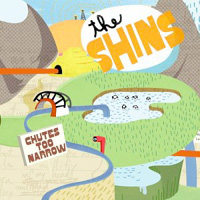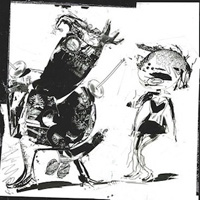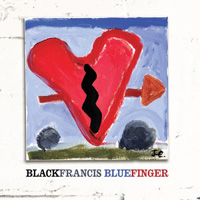 Grand Duchy
Grand Duchy
Let the People Speak (Sonic Unyon)
by Scott Deckman
I already had this review written out, all but a few nagging fact checks, and then I listened to Grand Duchy‘s Let the People Speak all the way through again, and maybe it was the way I was feeling at that moment, but I definitely began seeing it a bit differently. Originally, I was going to lead off with “Not my thing,” pairing it with how I felt about Brian Jonestown Massacre’s Aufheben, the last review I wrote in this category for Lollipop. And hey, while it still may not be my thing, I can finally feel where they’re coming from a little more and in the right mood, yes, I can appreciate it and even hum along.
A chief problem with this album as compared to Grand Duchy’s very good debut, Petits Fours, is that it’s clearly wife Violet Clark’s record more than Black Francis’, as evidenced by Clark serving as producer. Another thing, the majority of Francis-sung songs remind one of The Golem, his (edited) 2011 score to the 1920 silent movie The Golem: How He Came into the World, that and his 2010 collection, Abbabubba: B-Sides, Etc. These releases weren’t terrible, but for him, they were on the weak side.
This album is sexual, like much of Francis’ work, with Clark going so far as to say on Sonic Unyon Records’ site that, where Petits Fours was missionary, Let the People Speak needed to be doggy style. But unlike the confident pounding she portends (and this despite her at-times dripping vocals), it feels more like an experiment in the sack gone awry, vibrators being used to liven things up, straps, play-choking, safe words – kinda lame when it comes to that. The album has a semi-leitmotif of Andy Warhol’s Factory and the Manhattan of his and Lou Reed’s heyday, maybe the mid ’60s/early ’70s, but shot into the future (Sonic Unyon Records says something similar on their site), and at least partially told by a Factory wannabe.
And the sounds themselves on this record are more experimental, for sure: More technology, more odd noises; there’s the same reliance on synths, but now they’re used in a less melodic way, veering more toward the rhythmic (and just plain weird and futuristic). In fact, parts of this record could qualify as dance music. Plus, these two trying to be space-age funksters at times is either a bit misguided or embarrassing, take your pick. And where Petits Fours didn’t have a real unifying concept (that I know of), it was sonically coherent, a good mix of Black’s melody and roar and Clark’s can-be-cutesy, sexy voice, a great modern take on ’80s synth pop with just enough rock and strangeness to work. Let the People Speak, on the other hand, while obviously attempting a loose narrative and admirable in scope, comes off as a spacy, disjointed affair. On the whole, there just aren’t a lot of strong songs all the way through.
But the first thing that jumps out at the listener is the voice of American expat DJ Jonathan L on “The Lopsided World of L,” amid a throwaway noise-loop (“The Lopsided World of L” is the name of said DJ’s radio show). Jonathan L talks between each song. With 16 of them, at first it’s annoying; then you get used to it. But Frank Black never needed the help of a smooth voice before to buttress his work, though again, this time it’s more his wife’s canvas than his. Another so-so experiment producing a so-so result.
It’s always funny having Black/Francis/Thompson singing about the outré (and it’s been a calling card from the beginning of his career), because, while his mind is likely as randy as any artist you’ll find, in his everyday life, he seems like a pretty normal guy. I don’t think you’d find him hanging out in the Factory if he were around in the ’60s (or not consistently, anyway), and unless I’m wrong, I don’t think he frequents androgynous, decadent sex clubs in Portland, Oregon, either. And if he does, I hope I never find out about it! (“I was wearing eyeliner/She was wearing eyeliner” … uh oh.) Though at times a highlight, he doesn’t need the shock value: He’s brilliant and imaginative, with an ear for hooks and a shape-shifting Elmer Fuddish voice that can either scrape paint off the walls or give you a reason to live. So he gets a pass on pretty much everything from me, even this messy bricolage.
So what made me a little more sympathetic to the album’s purpose (other than seeing its vision more clearly in my frazzled brain)? Some of the songs kept growing on me. Take “Geode,” for instance. The second two-thirds or so is pretty good, when Clark lets the light melody of the song take over from the obnoxious, funky electronica she likes so much; but yeah, even then, this is a rhythm-based song. “White Out” is at times reminiscent of Romeo Void’s “Never Say Never,” though it never seems to coalesce like the latter. Parts of “John Frum” are interesting (a song concerning the cargo cult hero), and “Annie Bliss” tells of a girl’s probably-permanent venture into the big city, maybe even referring to a Factory diva; to be truthful, I don’t know. Francis sing-speaks the tale, later joined by his wife; this trippy bit of storytelling might not qualify as conventional music, but it may be the record’s most memorable moment. The bluesy guitar work tacked onto the end, as basic as it is, is quite tasteful as well. And “Silver Boys” is a catchy paean to arty Factory faggotry. I do like the chorus though, God forgive me. And, I don’t wanna be painted in oil, either. The odd thing: The album is named after the weakest song on here, closer “Let the People Speak.”
Though a commendable effort at creating an alternative universe, this is still more of a hodgepodge of interesting moments at the expense of real songs. Note to Frank: Hey, if it keeps the marriage exciting, by all means, keep cutting subpar records with the wife (not fair, as Petits Fours was the goods), but just be sure to follow up 2010’s understated sleeper Nonstoperotik. We’re due a good one from you.
(www.sonicunyon.com)



